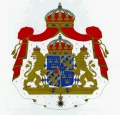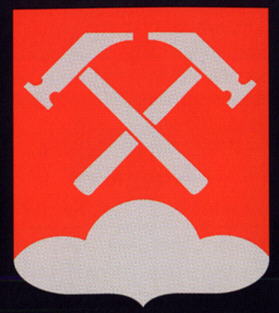Kumla: Difference between revisions
Jump to navigation
Jump to search
Knorrepoes (talk | contribs) m (Text replacement - "===Official blazon===" to "{| class="wikitable" |+Official blazon |- |'''Swedish''' | ") |
Knorrepoes (talk | contribs) m (Text replacement - ". ===Origin/meaning===" to "|- |'''English''' | {{blazon wanted}} |} ===Origin/meaning=== ") |
||
| Line 14: | Line 14: | ||
| | | | ||
I rött fält två korslagda hammare i silver ovanför ett treberg i silver | I rött fält två korslagda hammare i silver ovanför ett treberg i silver|- | ||
|'''English''' | |||
| {{blazon wanted}} | |||
|} | |||
===Origin/meaning=== | ===Origin/meaning=== | ||
The arms were officially granted in 1945. | The arms were officially granted in 1945. | ||
Revision as of 11:35, 24 July 2022
Sweden heraldry portal
This page is part of the Sweden heraldry portal |
Heraldry of the World |
|
Civic heraldry:
|
Other heraldry: |
KUMLA
Province (Landskap): Närke
County (Län): Örebro län
Additions : 1967 Kumla rural municipality (1952 Hardemo); 1971 Ekeby och Gällersta (1952 Ekeby, Gällersta)
| Swedish |
I rött fält två korslagda hammare i silver ovanför ett treberg i silver|- |
English | No blazon/translation known. Please click here to send your (heraldic !) blazon or translation |
Origin/meaning
The arms were officially granted in 1945.
The arms refer with the shoemaker's hammer to the importance of shoe making in the 18th and 19th century. The base refers to the Kumla hills, a large prehistoric grave field.
Contact and Support
Partners:
Your logo here ?
Contact us
© since 1995, Heraldry of the World, Ralf Hartemink 
Index of the site
Literature : Nevéus and de Waern, 1992












